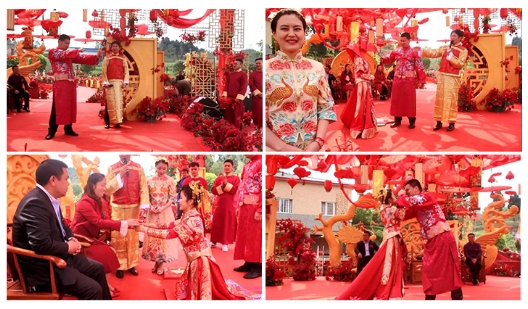Topic Discussion- Weddings
Topic Discussion
The article is only for auxiliary discussion
Article

Chinese Weddings: A Celebration of Tradition and Harmony
Weddings in China are more than just joyous occasions; they are intricate ceremonies deeply rooted in tradition and symbolism. These celebrations blend ancient customs with modern elements, creating a unique and unforgettable experience. Let’s take a closer look at the fascinating world of Chinese weddings.
1. The Engagement: Matchmaking and Betrothal Gifts
Traditionally, Chinese marriages were arranged by parents, and matchmaking was a crucial step. While arranged marriages are less common today, some families still employ matchmakers to help find suitable partners. Once a match is made, the couple’s families exchange betrothal gifts, a practice known as “Guo Da Li.” These gifts symbolize goodwill and commitment.
2. The Wedding Date: Auspicious Timing
Selecting the right wedding date is essential in Chinese culture. Couples often consult a Chinese calendar to find an auspicious day, as certain dates are believed to bring good luck and prosperity. Avoiding inauspicious dates, such as the ghost month and certain lunar calendar days, is equally important.
3. The Ceremony: Tea and Red
The wedding ceremony itself is a blend of ancient rituals and contemporary customs. One of the most significant customs is the Tea Ceremony, where the couple serves tea to their parents and elders. This symbolizes respect, gratitude, and the transition from child to adult.
Red is the dominant color throughout the wedding. It represents happiness, prosperity, and good luck. The bride typically wears a red wedding gown and may have multiple outfit changes during the day, with each dress elaborately adorned.
4. The Banquet: A Feast for Family and Friends
After the ceremony, a grand banquet is held to celebrate the newlyweds. Traditional Chinese dishes are served, with each dish carrying its own symbolic meaning. For example, a whole fish symbolizes unity and abundance, while noodles represent longevity.
5. Firecrackers and Lion Dances: Warding off Evil Spirits
To ward off evil spirits and bring good luck, firecrackers are often lit during the wedding procession. Lion dances, with performers in colorful lion costumes, add excitement and energy to the festivities. These customs create a lively and joyous atmosphere.
6. Modern Touches: Western-style Weddings
In urban China, Western-style weddings have gained popularity. Couples often incorporate elements like white gowns, tuxedos, and elaborate floral arrangements. They may exchange vows in a church or outdoor setting, blending Eastern and Western traditions.
7. The Red Envelope: A Token of Blessings
Gifts of money in red envelopes, known as “hongbao,” are given to the newlyweds as a token of blessings. The amount is typically an even number, as odd numbers are associated with funerals. Hongbao are also common gifts during other celebrations and festivals.
8. Wedding Photography: A Pre-wedding Ritual
Chinese couples often have pre-wedding photoshoots at picturesque locations. These photos are displayed at the wedding banquet and in the couple’s home. They capture the couple’s love story and are a cherished memento.
9. Family-Centered Celebrations
Chinese weddings emphasize family and community. The union of two individuals is seen as the joining of two families. It’s a time for family members to come together, offer blessings, and create lasting memories.
In conclusion, Chinese weddings are a captivating blend of tradition and modernity, where rituals dating back centuries are intertwined with contemporary customs. These celebrations reflect the rich cultural heritage of China, emphasizing family, harmony, and the pursuit of happiness. Whether steeped in ancient customs or influenced by Western trends, a Chinese wedding is a profound and meaningful event that showcases the diversity and depth of Chinese culture.